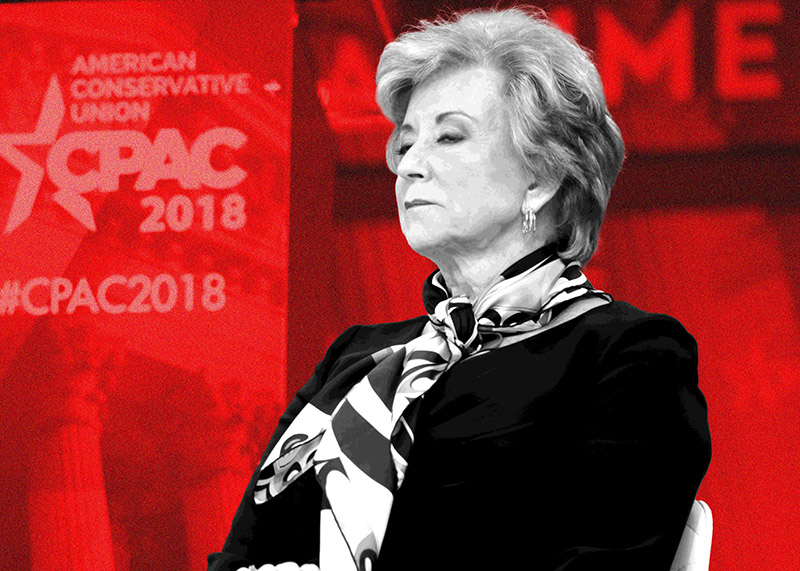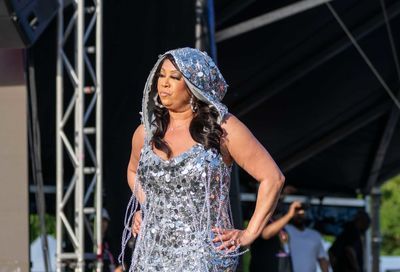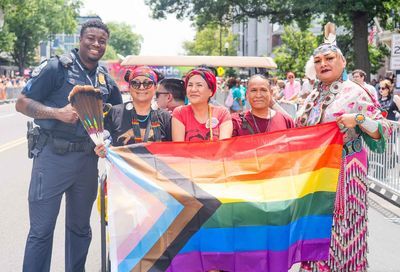Maine transgender man sues Dunkin’ Donuts franchise for wrongful termination and sexual harassment
Kye Hubbard claims he was outed against his will and retaliated against when he complained about his mistreatment at work
By John Riley on July 7, 2020 @JRileyMW

A transgender man has filed a federal discrimination lawsuit against a Dunkin’ Donuts franchise in Scarborough, Maine, alleging that he was sexually harassed by co-workers, demoted, and ultimately fired after being outed by his manager.
Kye Hubbard, of Westbrook, Maine, filed the lawsuit in the U.S. District Court for the District of Maine last Wednesday, alleging that he was harassed and discriminated against because of his gender identity.
The lawsuit names Cafua Management Co. LLC, a Massachusetts-based franchise which owns Dunkin’ Donuts stores in seven different states, and its subsidiary, Exit 42 Donuts, LLC, which operates the store where Hubbard worked for 11 months from February 2018 to January 2019.
In May 2018, Hubbard alleges that a store manager outed him as transgender to his co-workers, even though he had requested confidentiality. Afterwards, Hubbard’s co-workers sexually harassed him and called him several transphobic slurs.
When he complained to a corporate manager, he was told his supervisor would be fired, according to the lawsuit. But the store manager was simply transferred to another store.
In June, the franchise hired a new manager, who allegedly revoked some of Hubbard’s shift leader responsibilities and excluded him from management talks in which he had formerly participated. Hubbard also alleges that his computer privileges were revoked. When Hubbard threatened to report the manager’s conduct to Cafua’s human resources department, the manager allegedly asked if there was anything “sexually” she could do to prevent him from reporting her, according to the lawsuit.
That manager also repeatedly misgendered Hubbard, sent him a message calling him “sexy,” and posted a customer complaint about Hubbard for all other employees to see. After Hubbard filed a complaint about the second manager, he was demoted from his shift leader position.
Hubbard claims he was ultimately fired for vaping on work property about a week after telling management that he had reported the harassment to the Maine Human Rights Commission, even though other employees had been permitted to vape outside the store, so long as they were not seen by customers.
Two months after he was fired, Hubbard amended his complaint with the Human Rights Commission, reiterating his earlier allegations, and alleging that he was also discriminated against in violation of the Maine Human Rights Act — which prohibits discrimination based on sexual orientation or gender identity — as well as the Maine Whistleblowers’ Act and Title VII of the Civil Rights Act of 1964.
The U.S. Supreme Court recently ruled in a 6-3 decision that the prohibitions on sex discrimination in Title VII of the Civil Right Act apply to instances where LGBTQ people are discriminated against because of their sexual orientation or gender identity. As a result, LGBTQ people who believe they have been discriminated against in the workplace are now empowered to sue for damages and compensation.
See also: Trump was “surprised” by SCOTUS decision on LGBTQ workplace discrimination
A spokesperson for the Maine Human Rights Commission told the Bangor Daily News that the commission did not issue a formal determination in Hubbard’s case, but sent him a “right-to-sue letter” in December 2019 that allowed him to pursue a civil lawsuit.
According to the lawsuit, Hubbard is requesting a jury trial and is seeking back pay, compensation for mental anguish and financial stress, and reinstatement to his former position — or additional compensation, or “front pay,” if he can’t be reinstated.
Cafua Management Co. refused to comment on the pending lawsuit, but a company spokesperson said that Dunkin’ franchises are independently operated by owners, who make their own decisions about employment issues.
“Dunkin’ and our independent franchisees have a longstanding history of embracing diversity,” Dunkin’ Brands spokesperson Michelle King said. “Discrimination is completely inconsistent with our values, and we strive to create inclusive work cultures.”
Read more:
Gay realtor says he was beaten unconscious in Oklahoma anti-gay attack
New Jersey Republican congressional candidate regrets his vote against gay marriage
8th Circuit revives gay health care salesman’s lawsuit alleging employment discrimination
More From Metro Weekly:
Judge Halts Trump’s LGBTQ Funding Ban
Ruling halts enforcement of executive orders aimed at defunding LGBTQ health centers for supporting DEI or transgender rights.
By John Riley on June 12, 2025 @JRileyMW
A federal judge has blocked the Trump administration from enforcing provisions in a pair of anti-LGBTQ executive orders issued earlier this year that threatened to strip congressionally approved funding from LGBTQ service providers and health centers.
The provisions specifically target LGBTQ and HIV prevention organizations that engage in diversity, equity, and inclusion (DEI) initiatives or that promote so-called "gender ideology" by recognizing transgender identity as valid.
Tennessee Teen Sues After LGBTQ Post Triggers Suspension
A Christian school in Tennessee is being sued for suspending a student and withholding her diploma after she came out as gay on social media.
By John Riley on May 29, 2025 @JRileyMW
Morgan Armstrong recently announced on Instagram and Facebook that she is gay. She wrote that she was in a relationship and posted photos of herself with her girlfriend -- including one depicting the pair kissing. The caption read, "Cat's out of the bag."
Now her high school, the Tennessee Christian Preparatory School in Cleveland, Tennessee, has suspended the 18-year-old and is withholding her diploma and not allowing her to graduate.
A star basketball player for Tennessee Christian, Armstrong said she was nervous about how the news would be received, especially by relatives or other followers who oppose homosexuality.
Trump Declares June ‘Title IX Month,’ Snubbing Pride
The Education Department will use June to spotlight transgender rollbacks, investigate school policies, and promote a narrow view of Title IX.
By John Riley on June 9, 2025 @JRileyMW
The U.S. Department of Education announced that June would be honored as "Title IX Month."
The announcement is widely viewed as a swipe at the LGBTQ community, and in particular, the transgender community, which has traditionally June as Pride Month.
Title IX is the law prohibiting sex-based discrimination in educational institutions receiving federal funding.
Historically — and in the view of conservatives — Title IX was intended to protect individuals based on their sex assigned at birth, and is widely credited with expanding educational and athletic opportunities for women.
Support Metro Weekly’s Journalism
These are challenging times for news organizations. And yet it’s crucial we stay active and provide vital resources and information to both our local readers and the world. So won’t you please take a moment and consider supporting Metro Weekly with a membership? For as little as $5 a month, you can help ensure Metro Weekly magazine and MetroWeekly.com remain free, viable resources as we provide the best, most diverse, culturally-resonant LGBTQ coverage in both the D.C. region and around the world. Memberships come with exclusive perks and discounts, your own personal digital delivery of each week’s magazine (and an archive), access to our Member's Lounge when it launches this fall, and exclusive members-only items like Metro Weekly Membership Mugs and Tote Bags! Check out all our membership levels here and please join us today!
The Magazine
-
Most Popular
 D.C. Man Sentenced for Selling Fentanyl That Killed Two Gay Men
D.C. Man Sentenced for Selling Fentanyl That Killed Two Gay Men  Christian School Recruits Baseball Player, Then Says No Over Gay Dads
Christian School Recruits Baseball Player, Then Says No Over Gay Dads  JoJo Siwa Drops Pride Show, Rejects ‘Lesbian’ Label
JoJo Siwa Drops Pride Show, Rejects ‘Lesbian’ Label  Review: Sally Captures the Brilliance and Burden of Sally Ride
Review: Sally Captures the Brilliance and Burden of Sally Ride  Trans Health Care Ban Blocked by Senate Parliamentarian
Trans Health Care Ban Blocked by Senate Parliamentarian  Supreme Court Saves Free PrEP
Supreme Court Saves Free PrEP  Review: Rent Free Turns Couch Surfing Into Queer Comedy
Review: Rent Free Turns Couch Surfing Into Queer Comedy  Koby Falks, Gay Adult Film Star and OnlyFans Creator, Dies at 42
Koby Falks, Gay Adult Film Star and OnlyFans Creator, Dies at 42  Review: 28 Years Later Isn't Quite What You're Expecting
Review: 28 Years Later Isn't Quite What You're Expecting  Federal Judge Guts Iowa’s ‘Don’t Say Gay’ Law
Federal Judge Guts Iowa’s ‘Don’t Say Gay’ Law
 D.C. Man Sentenced for Selling Fentanyl That Killed Two Gay Men
D.C. Man Sentenced for Selling Fentanyl That Killed Two Gay Men  Christian School Recruits Baseball Player, Then Says No Over Gay Dads
Christian School Recruits Baseball Player, Then Says No Over Gay Dads  Trump Admin Threatens California Over Trans Athlete Policy
Trump Admin Threatens California Over Trans Athlete Policy  Review: Rent Free Turns Couch Surfing Into Queer Comedy
Review: Rent Free Turns Couch Surfing Into Queer Comedy  Review: Sally Captures the Brilliance and Burden of Sally Ride
Review: Sally Captures the Brilliance and Burden of Sally Ride  Trans Health Care Ban Blocked by Senate Parliamentarian
Trans Health Care Ban Blocked by Senate Parliamentarian  Supreme Court Sides With Religious Parents Over LGBTQ Books
Supreme Court Sides With Religious Parents Over LGBTQ Books  Supreme Court Saves Free PrEP
Supreme Court Saves Free PrEP  Delaware Shields Trans Health Care From Out-of-State Bans
Delaware Shields Trans Health Care From Out-of-State Bans  75 Arrested in Indonesia for Alleged 'Gay Party'
75 Arrested in Indonesia for Alleged 'Gay Party'
Scene
Metro Weekly
Washington's LGBTQ Magazine
P.O. Box 11559
Washington, DC 20008 (202) 527-9624
About Us pageFollow Us:
· Facebook
· Twitter
· Flipboard
· YouTube
· Instagram
· RSS News | RSS SceneArchives
Copyright ©2025 Jansi LLC.





















You must be logged in to post a comment.